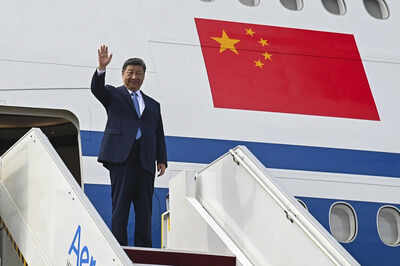
Chinese President Xi Jinping has reportedly declared artificial intelligence (AI) a cornerstone of the next technological revolution, urging China to seize a competitive edge in this transformative field. Speaking at a high-level meeting of the Communist Party focused on emerging technologies, Xi emphasized that AI is reshaping human production and lifestyles, positioning it as a strategic priority for China’s global ambitions. His remarks, reported by state-run Xinhua, underscore Beijing’s determination to lead the AI race while navigating growing international tensions over its technological advancements.
Xi called for leveraging China’s unique system of resource mobilization to drive AI innovation, emphasizing self-reliance and application-driven development. He advocated for a balanced approach, promoting AI’s growth in a way that is “beneficial, safe, and equitable.” Acknowledging gaps in foundational theories and core technologies, Xi urged accelerated efforts in scientific research, industrial applications, and regulatory frameworks to ensure China retains control over both AI development and governance. “We must comprehensively advance sci-tech innovation and firmly grasp the initiative,” he stated, signaling a long-term vision to close the gap with global leaders like the United States.
China’s AI ambitions are part of a broader push to dominate emerging technologies. In recent years, the country has ramped up investments in AI, quantum computing, and electric vehicles (EVs), emerging as a global leader in EV production. The Chinese military has also begun integrating AI into non-combat applications, such as logistics and surveillance, raising concerns among Western nations about potential dual-use capabilities. According to a 2024 report by the Center for Strategic and International Studies, China’s AI investment reached $25 billion in 2023, second only to the U.S., with state-backed firms driving much of the progress.
A notable example of China’s AI prowess is DeepSeek, a low-cost AI model developed by Chinese tech firm High-Flyer. Launched in early 2025, DeepSeek gained global attention for its affordability and performance, positioning it as a competitor to Western models like those from OpenAI. However, the tool has sparked controversy. On April 17, the U.S. House Select Committee on Strategic Competition labeled DeepSeek a “profound threat” to national security, alleging ties to the Communist Party and accusing it of undermining U.S. technological leadership. The committee’s report cited concerns over data privacy and potential military applications, reflecting broader anxieties about China’s growing influence in AI.
The backlash against DeepSeek has not been limited to the U.S. Countries like India, Japan, and Australia have imposed restrictions on its use by government officials, citing risks of data leaks and espionage. India’s Ministry of Electronics and Information Technology, for instance, flagged DeepSeek’s data collection practices as a potential violation of its 2024 Digital Personal Data Protection Act. These restrictions have fueled accusations from Beijing that the West and its allies are politicizing trade and technology. Chinese Foreign Ministry spokesperson Lin Jian recently condemned the bans, arguing they “stifle innovation and distort global cooperation.”
Trump Tariffs and the new Cold War
Xi’s push for AI leadership comes amid an intensifying U.S.-China tech rivalry, often described as a new Cold War. The U.S. has tightened export controls on advanced semiconductors and AI technologies, aiming to curb China’s access to critical components. In response, China has doubled down on domestic innovation, with firms like Huawei and Baidu making strides in AI chip development despite Western sanctions. A 2025 analysis by the Brookings Institution noted that China’s focus on applied AI—such as facial recognition and smart cities—has given it an edge in real-world deployments, even if it lags in foundational research.
However, China’s AI strategy faces challenges. Experts point to a shortage of top-tier talent and overreliance on state-driven investment as potential bottlenecks. From an international perspective, China’s AI rise is both an opportunity and a concern. Developing nations in Africa and Southeast Asia have welcomed affordable Chinese AI tools, which offer cost-effective solutions for healthcare, agriculture, and education. Yet, fears of data sovereignty and dependency on Chinese tech have prompted calls for stricter oversight. The European Union, for instance, is exploring a “third way” in AI governance, balancing innovation with ethical standards to counter both U.S. and Chinese dominance.
Made-in-China strategy
Xi’s vision for AI reflects China’s broader goal of achieving technological self-sufficiency by 2035, a target embedded in its 14th Five-Year Plan. With initiatives like the “Made in China 2025” strategy, Beijing is positioning AI as a driver of economic growth and geopolitical influence. However, the path forward is fraught with risks, from escalating trade disputes to ethical dilemmas surrounding AI surveillance and autonomous systems.






